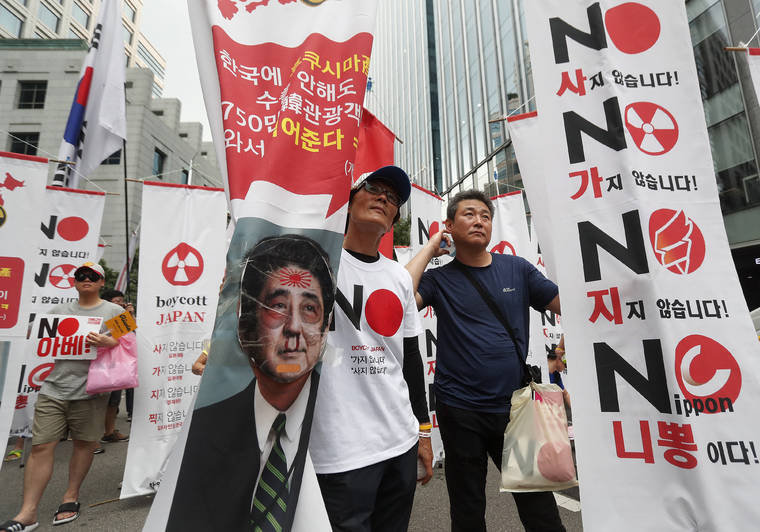SEOUL, South Korea — Waving banners and signs and chanting anti-Japan slogans, thousands of South Koreans marched in Seoul on Saturday to express their anger at Japan’s decision to downgrade South Korea’s trade status amid an escalating diplomatic row.
Huge crowds swarmed the streets in front of the Japanese Embassy, carrying signs that read “Boycott Japan” and “No Abe,” referring to Japanese Prime Minister Shinzo Abe. They shouted “We condemn the Abe government” and “Let’s end humiliating South Korea-Japan relations.”
The protesters later marched to a nearby boulevard for a candlelight vigil, also calling for the Seoul government to end a military intelligence-sharing pact with Tokyo and fully discard a 2015 deal between the countries over compensating South Korean women who were forced to work in Japan’s World War II military brothels.
Police didn’t immediately provide a crowd estimate, but organizers said about 15,000 people participated in the rallies.
The protest came a day after Japan’s Cabinet approved the removal of South Korea from a list of countries with preferential trade status, which would require Japanese companies to apply for case-by-case approvals for exports to South Korea of hundreds of items deemed sensitive.
The decision followed a July measure to strengthen controls on certain technology exports to South Korean companies that rely on Japanese materials to produce semiconductors and display screens used in smartphones and TVs, which are key South Korean export products.
South Korea says the Japanese trade curbs could hurt its export-dependent economy and has accused Japan of weaponizing trade to retaliate over bilateral disputes stemming from their bitter wartime history.
The Japanese trade measures have stoked public anger in South Korea, where many believe Japan still hasn’t fully atoned for atrocities committed during its colonial occupation of Korea from 1910 to 1945.
An increasing number of South Koreans have been boycotting Japanese consumer goods and travels to Japan. Police said a 72-year-old man died on Saturday, two days after setting himself ablaze in front of the Japanese Embassy to protest Japan’s trade curbs. The incident came weeks after a 78-year-old man died after self-immolating near the Japanese Embassy, also in protest of Tokyo.
South Korean President Moon Jae-in promised “stern” countermeasures against the Japanese measures, which he described as a deliberate attempt to damage South Korea’s economy and also a “selfish” move that could disrupt global supply chains. He accused Japan of retaliating against South Korean court rulings that ordered Japanese companies to compensate Korean plaintiffs for their wartime labor during Japan’s 1910-1945 colonization of the Korean Peninsula.
South Korean officials have vowed tit-for-tat retaliation, including taking Japan off its own “white list” of nations receiving preferential treatment in trade. Moon’s office said Seoul will also consider ending its military intelligence -sharing pact with Japan as part of its countermeasures, saying it could be difficult to share sensitive information considering the deterioration of trust between the countries.




